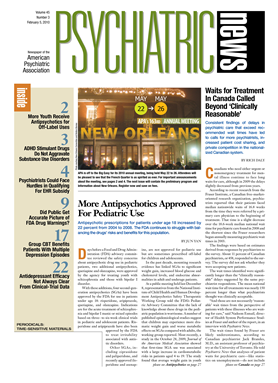Days before a Food and Drug Administration (FDA) advisory committee reviewed the safety concerns about antipsychotic drug use in pediatric patients, two additional antipsychotics, quetiapine and olanzapine, were approved by the agency for treating youth with schizophrenia and those with bipolar I disorder.
With these additions, four second-generation antipsychotics (SGAs) have been approved by the FDA for use in patients under age 18: risperidone, aripiprazole, quetiapine, and olanzapine. Indications are for the acute treatment of schizophrenia and bipolar I manic or mixed episodes based on three- to six-week clinical trials in pediatric and adolescent patients. Risperidone and aripiprazole have also been approved by the FDA to treat irritability associated with autistic disorders.
Other SGAs, including ziprasidone and paliperidone, and recently approved iloperidone and asenapine, are not approved for pediatric use but are sometimes prescribed off-label for children and adolescents.
In the past decade, mounting research evidence has linked SGAs to significant weight gain, increased blood glucose and cholesterol levels, and endocrine abnormalities in adult and underage patients.
At a public meeting held last December 8, representatives from the National Institute of Child Health and Human Development Antipsychotics Safety Therapeutic Working Group told the FDA's Pediatric Advisory Committee that the lack of knowledge about these drugs in the pediatric population is worrisome. A number of published epidemiological studies suggest that children may experience more dramatic weight gain and worse metabolic effects on SGAs compared with adults, the working group reported. Most recently, a study in the October 28, 2009, Journal of the American Medical Association showed that first-time SGA use was associated with a large increase in cardiometabolic risks in patients aged 4 to 19. The study found that average weight gain in youth taking SGAs ranged from 4.4 kg (aripiprazole) to 8.5 kg (olanzapine) after a median of 10.8 weeks.
The working group urged the FDA and National Institutes of Health to fund and conduct postmarketing studies, both retrospective and prospective, to clarify the long-term effectiveness and safety of SGAs in children and adolescents.
The FDA has been widely criticized for approving SGAs for pediatric indications despite the serious metabolic risks. However, an analysis conducted by FDA staff indicates that a lack of FDA approval has not prevented physicians from prescribing SGAs for pediatric patients for unapproved, or off-label, indications. At the advisory meeting, Laura Governale, Pharm.D., M.B.A., a drug utilization data analyst at the FDA's Office of Surveillance and Epidemiology, told the Pediatric Advisory Committee that outpatient prescriptions of SGAs in the pediatric population (0 to 17 years) increased 22 percent from 2004 to 2008.
The FDA analysis was based on the SDI Vector One National and SDI Physician Drug and Diagnosis Audit databases for prescription drugs. It found that 4.80 million prescriptions for SGAs were dispensed in 2008 for pediatric patients, and a majority of these prescriptions were for patients aged 13 to 17. The largest increase was for aripiprazole, which rose by 96 percent during the five-year period. Based on audits of ICD-9 diagnoses, 16 percent of the patients aged 13 to 17 were prescribed SGAs in association with “bipolar affective NOS” and 9 percent each received SGAs for “other/mixed emotional disturbance of childhood/adolescence” and “attention deficit disorder.”
At the FDA's request, the advisory committee reviewed and discussed at the meeting the safety data of aripiprazole in pediatric use. The committee determined that the current labeling of aripiprazole does not adequately warn of the weight-gain risk in this patient population and recommended ongoing standard monitoring.
